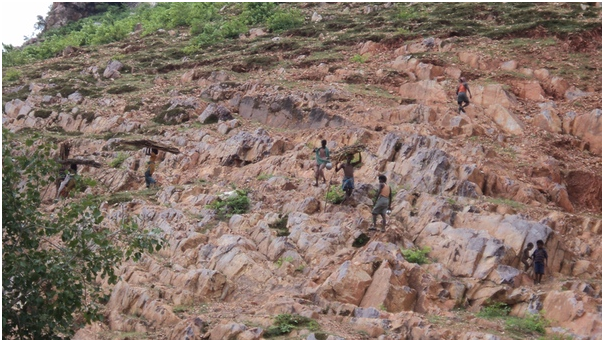He was an outcast, a landless labourer who had to trek across an entire mountain every day, just to reach the farm that he worked on. It was a treacherous trek, and led to accidents often. His people needed help, there were lives at stake every day. He decided, if no one would help his people, he would. Then, without pausing for a thought, he went ahead and did just that with his bare hands.
.jpg)
It was 1960. Landless laborers, who lived amid rocky terrain in the remote Atri block of Gaya, Bihar, in northern India. In the community of Gehlour, they were regarded the lowest of the low in a caste-ridden society, and denied the basics: water supply, electricity, a school, a medical center.
Like all the Musahar men, Dashrath Manjhi worked on the other side of the mountain. At noon, his wife Phaguni would bring his lunch. As they had no road, the trek took hours over the mountain. Dashrath tilled fields for a landlord on the other side. He would quarry stone. And in a few hours from then, he would be tired and hungry.
Phaguni, Dashrath’s wife, prepared for her treacherous climb up the mountain. She wrapped the ‘rotis’, filled a container with a thin curry, and bundled the food into a square of cloth. She picked a small pot of water, and hoisted it on her head. Her children sat playing by their hut in the small Musahar settlement in the mountain’s shadow.
He would watch and wait for Phaguni. That day, she would come to him empty handed, injured. As the harsh sun beat down, Phaguni tripped on loose rock, and was badly injured. Her water pot shattered. She slid down several feet, injuring her leg. Hours past noon, she limped to her husband. He was angry at her for being late.
Dashrath bought a hammer, chisel, and crowbar. He had to sell his goats, which meant a lower income for his family. He climbed to the top, and started chipping away at the mountain. Years later, he would recount
Word spread far and wide. He would start early in the morning, chip the mountain for a few hours, then work on the fields, and come back to work on the mountain again. He would hardly sleep. The villagers gradually began to respect him, and started donating food to his family. He eventually quit his wage job, and started spending as much time as he could, breaking the mountain.
Then, Phaguni fell ill. The doctor was in Wazirganj, which stood just on the other side of the mountain, but the road leading to it was 75 kilometers long. Unable to make the journey, she passed away. Her death not only enraged him more, it spurred him on.
It was not an easy task. He would often get hurt by the rocks falling from the unyielding mountain. He would rest and then start again. At times, he helped people carry their things over the mountain for a small fee, money to feed his children. After 10 years, as Manjhi chipped away, people saw a cleft in the mountain and some came to help.
Manjhi broke through that last thin wall of rock, and walked into the other side of the mountain. After 22 years, Dashrath Das Manjhi, the common man, the landless laborer, had broken the mountain: he had carved out a road 360 feet long, 30 feet wide. Wazirganj, with its doctors, jobs, and school, was now only 5 kilometers away. People from 60 villages in Atri could use his road. Children had to walk only 3 kilometers to reach school. Grateful, they began to call him ‘Baba’, the revered man.
But Dashrath did not stop there. He began knocking on the Government’s doors, asking for the road to be tarred and connected to the main road. He did the unthinkable to get the government’s attention, he walked along the railway line all the way to New Delhi, the capital. He submitted a petition there, for his road, for a hospital for his people, a school and water. In July 2006, Dashrath went to the then Bihar Chief Minister Nitish Kumar’s ‘Junta Durbar’. The minister, overwhelmed, got up and offered ‘Baba’ his chair, his minister’s seat; a rare honor for a man of Manjhi’s social status.

The government rewarded his efforts with a plot of land; Manjhi promptly donated the land back for a hospital. They also nominated him for the ‘Padma Shree’, but the forest ministry officials fought the nomination, calling his work illegal. “I do not care for these awards, this fame, the money,” he said. “All I want is a road, a school, and a hospital for our people. They toil so hard. It will help their women and children.”
Hi! I am a robot. I just upvoted you! I found similar content that readers might be interested in:
https://www.thebetterindia.com/18326/the-man-who-moved-a-mountain-milaap-dashrath-manjhi/
Downvoting a post can decrease pending rewards and make it less visible. Common reasons:
Submit
The great man...
Downvoting a post can decrease pending rewards and make it less visible. Common reasons:
Submit
hi igave u all, so pliz back, dont forget,then see u
Downvoting a post can decrease pending rewards and make it less visible. Common reasons:
Submit